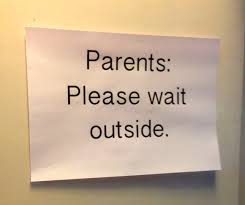 Since most students are on Spring Break this week, it is a great time to talk to parents, stakeholders and mentors of college students about your role in your student’s success. So today’s GradeUP! Challenge (#13 in the series) is for anyone who is supporting a college student financially and/or with advice and counsel. If your student is struggling, and by midterms they know if they are, it’s not always easy to know how to help. As a professor and advisor I face that dilemma multiplied by 3 classes each semester and by 60 students as their academic advisor. After working with so many students I’ve been able to figure out the best way to motivate and keep my students on track. What works, every time, is to give them practical, proactive tools they can use to get, and keep, their grades up. I mentor my students by sharing specific tasks that any student can integrate into their study routine and that have proven successful in helping students get and keep their Grades Up.
Since most students are on Spring Break this week, it is a great time to talk to parents, stakeholders and mentors of college students about your role in your student’s success. So today’s GradeUP! Challenge (#13 in the series) is for anyone who is supporting a college student financially and/or with advice and counsel. If your student is struggling, and by midterms they know if they are, it’s not always easy to know how to help. As a professor and advisor I face that dilemma multiplied by 3 classes each semester and by 60 students as their academic advisor. After working with so many students I’ve been able to figure out the best way to motivate and keep my students on track. What works, every time, is to give them practical, proactive tools they can use to get, and keep, their grades up. I mentor my students by sharing specific tasks that any student can integrate into their study routine and that have proven successful in helping students get and keep their Grades Up.
In February, I launched The College in Four Years GradeUP! Challenge on my website. Over the first half of the Spring Semester I’ve posted a dozen of these “Challenges” as a way to virtually mentor any student who can benefit from the help and information I share with students as a professor and advisor. Each week I post two short, easy to accomplish and integrate suggestions to help students improve or maintain academic progress so they can graduate on time with great grades and job prospects. I’ll continue to add a Challenge each Tuesday and Thursday through April 30.
I invite and encourage you as parents, mentors and stakeholders to share the College in Four Years GradeUP! Challenge with your student. Mid-semester, after they’ve had some downtime during Spring Break, is a great time to assess their progress so far and to help your student figure out if they’re on track using some of the tools I share in Challenge #10 and Challenge #11. It is not too late to get back on track using the GradeUP! Challenges I’ve posted previously and the ones I’ll post on Tuesdays and Thursdays in the coming weeks.
The tips and tactics from the GradeUP! Challenge are a great way to talk to your student about how they’re doing – the perfect balance between being a Helicopter Parent and too Hands-Off. You’ll find more information on the College in Four Years GradeUP! Challenge on my website and I even have a special page for parents, mentors and stakeholders to help you with the conversation.
For you and your student, remember the goal is graduation.

 Give students in college, going to college or considering college the gift of success this holiday season.
Give students in college, going to college or considering college the gift of success this holiday season.







